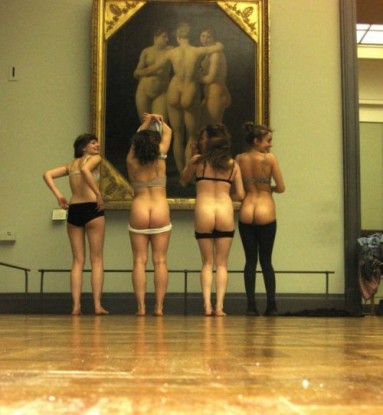A conversation between contributing editor Helena Fitzgerald and managing editor Malcolm Harris on the pictures and practices of internet nudity.
Malcolm: Is there a difference between nudity on the internet and online pornography?
Helena: The ubiquity of one necessitates a more precise definition of the other. An image of a naked body is no longer necessarily categorized automatically as pornography. More and more people can say, “Well, there are naked pictures of me on the internet, but they’re artistic, not pornographic or dirty.” It was easier to see the distinction in previous generations when there were very clearly different contexts or frames for art and for pornography. Porn was defined by being available only in contexts in which arousal was the goal.
Malcolm: The internet fucks with this because it’s not in control of its context. All visitors experience an art gallery in more or less the same fashion, but visitors to a website come as they are. Maybe that’s masturbating, maybe it’s taking notes.
Helena: Mostly masturbating.
Malcolm: Maybe, but they could be masturbating to spring break beach photos on Facebook or artsy nudes on Tumblr or gang-bang videos. To call all three of these porn because people get off to them would be overreaching. So by remainder we have a category of nudes that may or may not be particularly erotic but would be inappropriate to call pornographic – thus a site like Art or Porn?

Helena: I don’t know if the division is particularly useful anymore. Somewhat surprisingly, a lot of women use Tumblr for reblogging porn or what could be considered porn. This implies that women — or people in general — didn’t have a problem with porn so much as bad porn with its plastic mounds of robotic flesh.
Tumblr, as a user-directed medium, releases porn from those traditional visual cues. It allows the viewer to look at porn without feeling like she is, you know,looking at porn. Without the surrounding ads for dick enhancement or phone-sex pop ups of commercial online porn, looking at naked bodies becomes a much less urgent or anxious activity. One doesn’t necessarily have to feel that looking at naked bodies has anything to do an orgasmic teleology. At least not consciously, anyway.
Malcolm: Big-budget pornographers are going to stick to the proven formulas, so it seems there will be much more amateur work on Tumblr. What’s nice is that advances in consumer electronics have made high-quality images and video easier to produce. So any photographer — or even any college couple with a nice cell phone — has access to the entire means of pornographic production and distribution. An anticorporate porn movement seems more possible than ever. Maybe we are the porn we’ve been waiting for.
Helena: Well, we have, and will likely continue have, a great historical record of what photographers’ girlfriends look like topless. But the whole public discussion about internet nudity as distinct from porn starts with celebrity sex tapes — I mean, how grassroots or anticorporate could a medium be if its pioneer was Paris Hilton?
Malcolm: That’s a good point, but with the celebrity sex tape what we have is more celebrities behaving like normal people than normal people behaving like celebrities. As Us Weekly reminds us: They’re just like us! And people have recorded themselves having sex, no doubt, for as long as the technological capacity has existed. The celebrity sex tape doesn’t so much normalize the making of sex tapes but the discussion of them in public. Camera phones mean nude pictures, but it’s newsworthy only if the media can link it to public figures or crime.
Helena: Right, okay, Anthony Weiner. Multimedia sexting has now become a standard-enough practice that whenever there’s a scandal, we wait for the phone pictures to leak.
Malcolm: This was something people were always already doing (sending each other nudie pics), but how does all this publicity affect the practice?
Helena: On the personal level, people seem to expect that they can just ask for naked photos from a sexual partner at an early point in the relationship. It has become not a particular or intimate activity but almost an obligation. Sending naked pictures has gone from an experimental thing between committed partners to a standardized stage of flirting. Having seen someone naked in person seems to lead immediately to the assumption that one therefore has the right to a digital copy of that image.

Malcolm: That sounds like a negative turn, and no one like the idea of creepy exes showing nude pictures of them to their friends. But eventually no one is going to care. So our flirting and sexual practices change in relation to technology — so what? The cops and parents will get over kids sending each other “show-me-yours” pics. No one is better about getting blasé about such things than teenagers. There’s nothing wrong with it.
Helena: But what about when they grow up? Who wants pictures of themselves at 18 —
Malcolm: — or 16.
Helena: Or 16 being online forever? What about future employers?
Malcolm: When I was in college, I was an intern at a nonprofit in D.C. In a conversation it came out that almost everyone in the office had at least one tattoo. Now, even a few years ago, “serious people” said getting a tattoo would mean ruining every real job interview forever. It’s just not true anymore, if it ever was.
Helena: And the more pictures there are on the Web, the smaller the chances that you run into any given one. It’s like hiding in plain sight. And when we do turn up pictures of people we know, hopefully we’ll judge them like art, on compositional quality or lighting rather than simply be outraged by the sight of exposed flesh.
Malcolm: It’s certainly not unprecedented. Carla Bruni Sarkozy has plenty of topless photos out there, but they’re nice and she’s French, so no one is angry. Why can’t that work for someone you recognize from Human Resources or math class?


